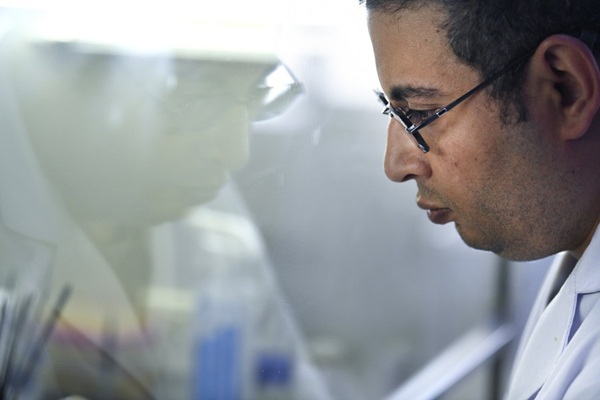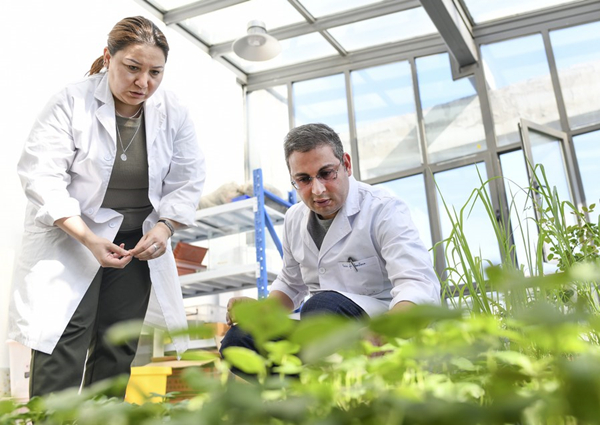Across China: Egyptian scientist finds advantageous life in Xinjiang
2021-06-28

Photo taken on May 18, 2021 shows Osama Abdalla Abdelshafy Mohamed working in the lab of the Xinjiang Institute of Ecology and Geography under the Chinese Academy of Sciences. (Xinhua/Wang Fei)
by Xinhua writers Zhang Zhongkai and Pan Ying
URUMQI, June 25 (Xinhua) -- For Osama Abdalla Abdelshafy Mohamed, an Egyptian scientist who has been living in northwest China's Xinjiang Uygur Autonomous Region for over four years, one thing has long remained largely unchanged.
"My first impression of Xinjiang is also the lasting impression," said Osama, who describes the western Chinese region as a safe, beautiful, diverse and hospitable place.
As a researcher at the State Key Laboratory of Desert and Oasis Ecology of the Xinjiang Institute of Ecology and Geography (XIEG), under the Chinese Academy of Sciences (CAS), Osama began his ties with Xinjiang in 2014.
Li Li, a classmate of Osama during his four-year doctoral study at Northwest A&F University (NWAFU) in Shaanxi Province, introduced him to both Professor Li Wenjun, the group leader of the laboratory of Extreme Environmental Microbiology, and to a fellowship research project called the Talent Young Scientist program at the Xinjiang institute.
Osama had no idea about Xinjiang at the time. He researched it online, only to find many sensational reports from several foreign news organizations. A little worried, Osama contacted Li Li's husband Ma Jinbiao, also his classmate.
Ma was born and raised in Tacheng, a picturesque region in north Xinjiang known for its ethnic diversity. "He told me that these reports were not facts, and they live in good conditions and (have) a happy life in Xinjiang," said Osama. "Of course I chose to believe my friend."
Osama's choice was right. When he came to Xinjiang in October 2014, his first impression was that it was "quite a normal place."
"I didn't feel anything strange," said Osama, adding that he enjoys the local life, including diverse cultures and easy access to different kinds of halal food.
Xinjiang is one of the most ethnically diverse regions in China. People here enjoy the freedom to speak their own language, Osama said. "Wherever you turn on the TV or radio in Xinjiang, you can find many channels showing programs in the local ethnic language."
So he didn't believe all the Western news on Xinjiang, and he still does not believe it, he said. "It is fake."
Despite ethnic differences, Osama feels that "all these people are united together to work for a better life." He said life in Xinjiang is changing for the better as the central and local governments try their best to facilitate good conditions for local people.

Photo taken on May 18, 2021 shows Osama Abdalla Abdelshafy Mohamed (R) studying plants with his colleague at the Xinjiang Institute of Ecology and Geography under the Chinese Academy of Sciences. (Xinhua/Wang Fei)
Osama has noticed rapid infrastructure improvements in the city he lives in.
"When I first came to Urumqi, it was just the public transportation and the Bus Rapid Transit. Now we have the subway and also you can see that Urumqi is extending everywhere, with many new buildings," he said.
Osama has visited many places in Xinjiang and now considers himself a Xinjiang local. He feels like a member of Ma's big family in Tacheng, which he has visited several times.
During the COVID-19 outbreak in early 2020, Osama was in Egypt and felt that he should do something to help fight the virus in China. He donated 2,000 yuan (309 U.S. dollars) to hospitals in Wuhan, the then epicenter of the outbreak.
He said his help was nothing compared to the support he has received from China over the past decade. "I can say I am made in China in the scientific field because Chinese professors and classmates teach me how to do high-quality research and build my scientific career up."
Osama has produced a series of meaningful scientific results during his time at the XIEG. He co-published 36 SCI research articles, two book chapters and a book under the guidance of his supervisor Li Wenjun, and received the International Partnership Award for Young Scientists of the Chinese Academy of Sciences in 2019.
In May, Osama received the Tianshan Award, the top honor for foreigners living in Xinjiang in recognition of their contributions to the region's development.
As an associate professor at Egypt's Arish University, Osama is seeking to establish long-term cooperation between his university and CAS, including his dream to set up a joint lab center at Arish University under the framework of the Belt and Road Initiative.
Talking about his future plans, Osama said he would like to stay in Xinjiang "longer and longer and longer."
"Now and without any doubt I can say I wish to live in Xinjiang for more than 10 years."



